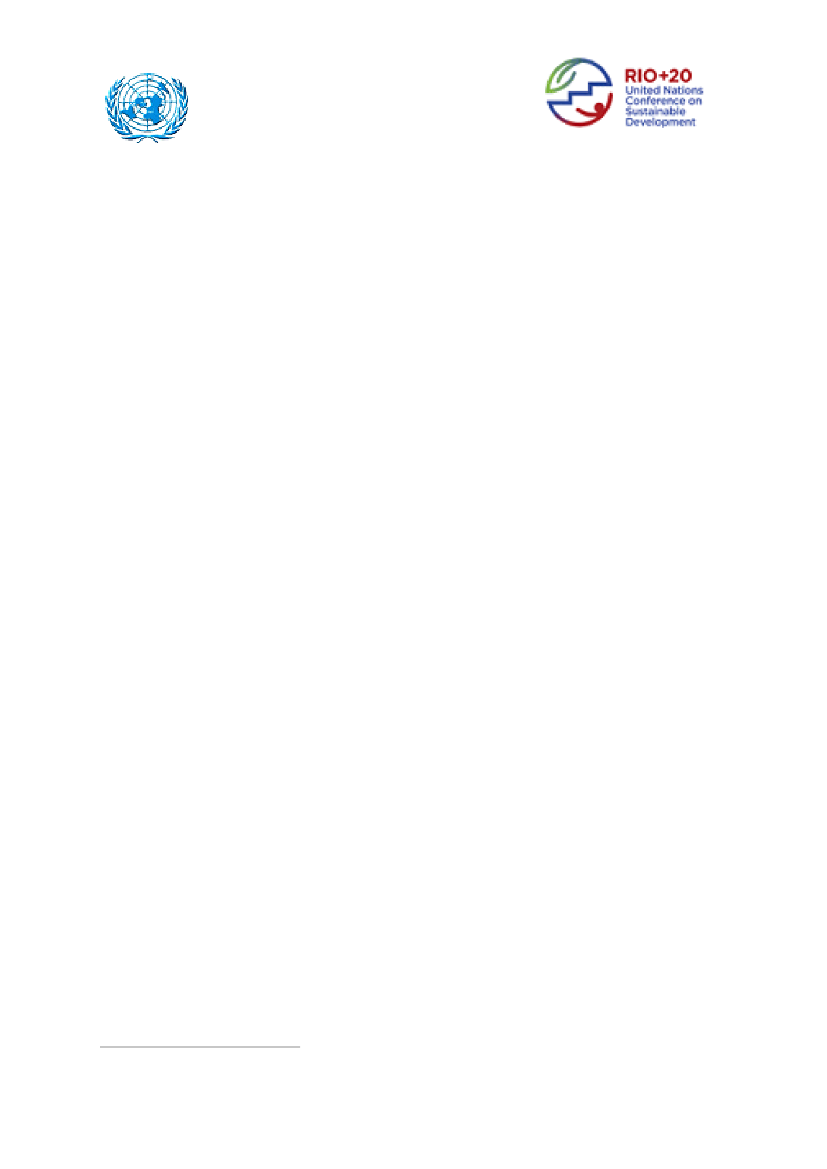Miljøudvalget 2011-12
MIU Alm.del Bilag 204
Offentligt
UNITED NATIONSJanuary 10, 2012
THE FUTURE WE WANT1TABLE OF CONTENTS
Paras
I. Preamble/Stage setting
Vision………………………………………………………………….1-5II. Renewing Political Commitment
A. Reaffirming Rio principles and past action plans…………………B. Assessing the progress to date and the remaining gaps in theimplementation of the outcomes of the major summits onsustainable development and addressing new and emergingchallenges (Integration, Implementation, Coherence)………………C. Engaging major groups……………………………………………..D. Framework for action……………………………………………….III. Green Economy in the context of sustainable development and
poverty eradication
A.Framing the context of the green economy, challenges andopportunities…………………………………………………….Toolkits and experience sharing…………………………………Framework for action……………………………………………6-910-1617-2122-24
25-3132-3637-43
B.C.
IV. Institutional Framework for Sustainable Development
A.B.C.Strengthening/reforming/integrating the three pillars……………GA, ECOSOC, CSD, SDC proposal…………………………….UNEP, specialized agency on environment proposal, IFIs,United Nations operational activities at country level…………4445-4950-58
1
Submitted by the co-Chairs on behalf of the Bureau in accordance with the decision in Prepcom 2 to present the zero-draftof the outcome document for consideration by Member States and other stakeholders no later than early January 2012.
1
D.
Regional, National, Local………………………………………
59-62
V. Framework for action and follow-up
A.B.C.Priority/key/thematic/cross-sectoral issues and areas……………Accelerating and measuring progress (SDGs, GDP and others)...Means of Implementation (finance, access to and transfer oftechnology, capacity building)…………………………………..63-104105-111112-128
2
1.We, the heads of State and Government, having met at Rio de Janeiro, Brazil, from20-22 June 2012, resolve to work together for a prosperous, secure and sustainable future forour people and our planet.2.We reaffirm our determination to free humanity from hunger and want through theeradication of all forms of poverty and strive for societies which are just, equitable andinclusive, for economic stability and growth that benefits all.3.We are committed to making every effort to accelerate progress in achieving theinternationally agreed development goals, including the Millennium Development Goals by2015, thus improving the lives of the poorest people.4.We are also committed to enhancing cooperation and addressing the ongoing andemerging issues in ways which will enhance opportunities for all, be centred on humandevelopment while preserving and protecting the life support system of our common home,our shared planet.5.We urge bold and decisive action on the objective and themes for the conference. Werenew our commitment to sustainable development and express our determination to pursuethe green economy in the context of sustainable development and poverty eradication. Wefurther affirm our resolve to strengthen the institutional framework for sustainabledevelopment. Taken together our actions should fill the implementation gaps and achievegreater integration among the three pillars of sustainable development – the economic, thesocial and the environmental.II.
Renewing Political Commitment
A. Reaffirming Rio principles and past action plans
6.We reaffirm that we continue to be guided by the purposes and principles of theCharter of the United Nations and with full respect for international law and its principles.7.We reaffirm our commitment to advance progress in implementation of the RioDeclaration on Environment and Development, Agenda 21, the Programme for the FurtherImplementation of Agenda 21, the Johannesburg Declaration on Sustainable Developmentand the Plan of Implementation of the World Summit on Sustainable Development, theBarbados Programme of Action and the Mauritius Strategy for Implementation. The RioPrinciples shall continue to guide the international community and serve as the basis forcooperation, coherence and implementation of agreed commitments.8.We also reaffirm our commitment to the Monterrey Consensus of the InternationalConference on Financing for Development, the Doha Declaration on Financing forDevelopment: the Political Declaration on Africa’s development needs, and the IstanbulProgramme of Action for Least Developed Countries.9.We recognize the need to reinforce sustainable development globally through ourcollective and national efforts, in accordance with the principle of common but differentiatedresponsibilities and the principle of the sovereign right of states over their natural resources.3
B. Assessing the progress to date and the remaining gaps in the implementation of the
outcomes of the major summits on sustainable development and addressing new and
emerging challenges (Integration, Implementation, Coherence)
10.We recognize that the twenty years since the Earth Summit in 1992 have seenprogress and change. There are deeply inspiring examples of progress, including in povertyeradication, in pockets of economic dynamism and in connectivity spurred by newinformation technologies which have empowered people.11.We acknowledge, however, that there have also been setbacks because of multipleinterrelated crises – financial, economic and volatile energy and food prices. Food insecurity,climate change and biodiversity loss have adversely affected development gains. Newscientific evidence points to the gravity of the threats we face. New and emerging challengesinclude the further intensification of earlier problems calling for more urgent responses. Weare deeply concerned that around 1.4 billion people still live in extreme poverty and one sixthof the world’s population is undernourished, pandemics and epidemics are omnipresentthreats. Unsustainable development has increased the stress on the earth's limited naturalresources and on the carrying capacity of ecosystems. Our planet supports seven billionpeople expected to reach nine billion by 2050.12.We note that national commitment to sustainable development has deepened. ManyGovernments now incorporate environmental and social issues into their economic policies,and have strengthened their commitment to sustainable development and the implementationof Agenda 21 and related agreements through national policies and plans, national legislationand institutions, and the ratification and implementation of international environmentalagreements.13.We nevertheless observe that, despite efforts by Governments and non-State actors inall countries, sustainable development remains a distant goal and there remain major barriersand systemic gaps in the implementation of internationally agreed commitments.14.We resolve to redouble our efforts to eradicate poverty and hunger and to ensure thathuman activities respect the earth’s ecosystems and life-support systems. We need tomainstream sustainable development in all aspects of the way we live. We acknowledge theparticular responsibility to nurture sustainable development and sustainable consumption andproduction patterns.15.We recognize the special challenges facing least developed countries, landlockeddeveloping countries, Small Island developing States, middle-income countries and Africancountries.16.We acknowledge the diversity of the world and recognize that all cultures andcivilizations contribute to the enrichment of humankind and the protection of the Earth’s lifesupport system. We emphasize the importance of culture for sustainable development. Wecall for a holistic approach to sustainable development which will guide humanity to live inharmony with nature.C. Engaging major groups
17.We underscore that a fundamental prerequisite for the achievement of sustainabledevelopment is broad public participation in decision-making. Sustainable developmentrequires major groups – women, children and youth, indigenous peoples, non-governmental4
organisations, local authorities, workers and trade unions, business and industry, the scientificand technological community, and farmers – to play a meaningful role at all levels. It isimportant to enable all members of civil society to be actively engaged in sustainabledevelopment by incorporating their specific knowledge and practical know-how into nationaland local policy making. In this regard, we also acknowledge the role of national parliamentsin furthering sustainable development.18.We recognize that improved participation of civil society depends upon strengtheningthe right to access information and building civil society capacity to exercise this right.Technology is making it easier for Governments to share information with the public and forthe public to hold decision makers accountable. In this regard, it is essential to work towardsuniversal access to information and communications technologies.19.We acknowledge the important role of the private sector in moving towardssustainable development. We strongly encourage business and industry to show leadership inadvancing a green economy in the context of sustainable development and povertyeradication.20.We also acknowledge the essential role of local governments and the need to fullyintegrate them into all levels of decision making on sustainable development.21.We recognize the importance of the UN Declaration on the Rights of IndigenousPeoples in the global, regional and national implementation of sustainable developmentstrategies. We also recognize the need to reflect the views of children and youth as the issueswe are addressing will have a deep impact on the youth of today and the generations thatfollow.D. Framework for action
22.We commit to improving governance and capacity at all levels – global, regional,national and local – to promote integrated decision making, to fill the implementation gapand promote coherence across institutions.23.We commit ourselves to reinvigorating the global partnership for sustainabledevelopment. We recognize that States must work together cooperatively and join with allstakeholders to address the common sustainable development challenges we face.24.We call for a global policy framework requiring all listed and large private companiesto consider sustainability issues and to integrate sustainability information within thereporting cycle.III. Green Economy in the context of sustainable development and poverty eradication
A. Framing the context of the green economy, challenges and opportunities
25.We are convinced that a green economy in the context of sustainable developmentand poverty eradication should contribute to meeting key goals – in particular the priorities ofpoverty eradication, food security, sound water management, universal access to modernenergy services, sustainable cities, management of oceans and improving resilience anddisaster preparedness, as well as public health, human resource development and sustained,inclusive and equitable growth that generates employment, including for youth. It should bebased on the Rio principles, in particular the principle of common but differentiated
5
responsibilities, and should be people-centred and inclusive, providing opportunities andbenefits for all citizens and all countries.26.We view the green economy as a means to achieve sustainable development, whichmust remain our overarching goal. We acknowledge that a green economy in the context ofsustainable development and poverty eradication should protect and enhance the naturalresource base, increase resource efficiency, promote sustainable consumption and productionpatterns, and move the world toward low-carbon development.27.We underscore that green economy is not intended as a rigid set of rules but rather asa decision-making framework to foster integrated consideration of the three pillars ofsustainable development in all relevant domains of public and private decision-making.28.We recognize that each country, respecting specific realities of economic, social andenvironmental development as well as particular conditions and priorities, will make theappropriate choices.29.We are convinced that green economy policies and measures can offer win-winopportunities to improve the integration of economic development with environmentalsustainability to all countries, regardless of the structure of their economy and their level ofdevelopment.30.We acknowledge, however, that developing countries are facing great challenges ineradicating poverty and sustaining growth, and a transition to a green economy will requirestructural adjustments which may involve additional costs to their economies. In this regard,the support of the international community is necessary.31.We note that the transformation to a green economy should be an opportunity to allcountries and a threat to none. We therefore resolve that international efforts to help countriesbuild a green economy in the context of sustainable development and poverty eradicationmust not:a) create new trade barriers;b) impose new conditionalities on aid and finance;c) widen technology gaps or exacerbate technological dependence of developingcountries on developed countries;d) restrict the policy space for countries to pursue their own paths to sustainabledevelopment.B. Toolkits and experience sharing
32.We acknowledge that countries are still in the early stages of building greeneconomies and can learn from one another. We note the positive experiences in developing agreen economy in some countries, including developing countries. We recognize that a mixof policies and measures tailored to each country’s needs and preferences will be needed.Policy options include, inter alia, regulatory, economic and fiscal instruments, investment ingreen infrastructure, financial incentives, subsidy reform, sustainable public procurement,information disclosure, and voluntary partnerships.33.We support the creation of an international knowledge-sharing platform to facilitatecountries’ green economy policy design and implementation, including:
6
a) a menu of policy options;b) a toolbox of good practices in applying green economy policies at regional,national and local levels;c) a set of indicators to measure progress;d) a directory of technical services, technology and financing that could assistdeveloping countries.34.We request the UN Secretary-General, in consultation with internationalorganizations, relevant entities of the UN system and others, to establish such a platform.35.We urge member States to make national presentations on their experiences in theappropriate institutional framework as described in Section IV below.36.We also urge all major groups, particularly business and industry, to share theirexperiences in this regard.C. Framework for action
37.We recognize the value of having a set of differentiated strategies, tailored to theneeds of different countries and different sectors.38.We encourage all States to develop their own green economy strategies through atransparent process of multi-stakeholder consultation.39.We encourage the United Nations, in cooperation with other relevant internationalorganizations, to support developing countries at their request in developing green economystrategies.40.We strongly encourage business and industry – organized by industrial sectors,cooperating across countries and in consultation with governments, workers and trade unionsand other stakeholders – to develop green economy roadmaps for their respective sectors,with concrete goals and benchmarks of progress, including for net creation of jobs.41.We acknowledge and encourage voluntary national commitments and actions by Stateactors as well as stakeholders to achieve a green economy in the context of sustainabledevelopment and poverty eradication, including through the shaping of innovativepartnerships.42.We realize that to make significant progress towards building green economies willrequire new investments, new skills formation, technology development, transfer and access,and capacity building in all countries. We acknowledge the particular need to provide supportto developing countries in this regard and agree:a) To provide new, additional and scaled up sources of financing to developingcountries;b) To launch an international process to promote the role of innovative instrumentsof finance for building green economies;c) To gradually eliminate subsidies that have considerable negative effects on theenvironment and are incompatible with sustainable development, complementedwith measures to protect poor and vulnerable groups;
7
d) To facilitate international collaborative research on green technologies involvingdeveloping countries, ensuring the technologies so developed remain in the publicdomain and are accessible to developing countries at affordable prices;e) To encourage creation of Centres of Excellence as nodal points for greentechnology R&D;f) To support developing countries’ scientists and engineers and scientific andengineering institutions to foster their efforts to develop green local technologiesand use traditional knowledge;g) To establish a capacity development scheme to provide country-specific adviceand, where appropriate, region and sector-specific advice to all interestedcountries and to assist them in accessing available funds.43.We recognize the importance of measuring global progress. In this regard, we will beguided by a roadmap that contains the following indicative goals and timeline:a) 2012~2015: establishment of indicators and measures to evaluate implementation;establishment of mechanisms for the transfer of technology, sharing of know-how,and enhancement of capacities;b) 2015~2030: implementation and periodic assessment of progress;c) 2030: comprehensive assessment of progress.We request the Secretary-General, in close cooperation with the UN system, to provide areport for the General Assembly at its 67th session, detailing further steps in this regard.IV.
Institutional framework for sustainable development
A. Strengthening/reforming/integrating the three pillars
44.We recognize that strong governance at local, national, regional and global levels iscritical for advancing sustainable development. The strengthening and reform of theinstitutional framework should, among other things:a) Integrate the three pillars of sustainable development and promote theimplementation of Agenda 21 and related outcomes, consistent with the principlesof universality, democracy, transparency, cost-effectiveness and accountability,keeping in mind the Rio Principles, in particular common but differentiatedresponsibilities.b) Provide cohesive, government-driven policy guidance on sustainable developmentand identify specific actions in order to fulfil the sustainable development agendathrough the promotion of integrated decision making at all levels.c) Monitor progress in the implementation of Agenda 21 and relevant outcomes andagreements, at local, national, regional and global levels.d) Reinforce coherence among the agencies, funds and programmes of the UnitedNations system, including the International Financial and Trade Institutions.8
B. GA, ECOSOC, CSD, SDC proposal
General Assembly
45.We reaffirm the central role of the General Assembly as the highest policy-makingbody, and call for it to further integrate sustainable development as a key element of theoverarching framework for United Nations activities.Economic and Social Council
46.We reaffirm that the Economic and Social Council is a central mechanism for thecoordination of the United Nations system and its specialized agencies and supervision of itssubsidiary bodies, in particular its functional commissions.47.We also reaffirm that ECOSOC is a central forum for intergovernmental deliberationson economic and social issues, and provides guidance and coordination to the UN system’soperational activities for development in the field.48.We agree to promote the role of ECOSOC in the integration of the three pillars ofsustainable development including by making better use of the coordination segment ofECOSOC for monitoring implementation of agreements on sustainable development and,similarly, making use of the ECOSOC operational activities and humanitarian segments topromote mainstreaming of sustainable development into programmes of UN agencies andprogrammes.Commission on Sustainable Development
49.We reaffirm the role of the Commission on Sustainable Development as the high levelcommission on sustainable development in the United Nations system. We agree to consideroptions for improving the working methods, the agenda and programme of work of theCommission to better facilitate, promote, and coordinate sustainable developmentimplementation, including measures to ensure more focused, balanced and responsiveengagement with a more limited set of issues, and enhanced implementation of its decisions.We also agree to consider means to enhance the review function of the Commission,including through a voluntary review process.ORSustainable Development Council
49 alt.We resolve to transform the CSD into a Sustainable Development Council thatwill serve as the authoritative, high-level body for consideration of matters relating to theintegration of the three dimensions of sustainable development49 alt. bisThe work of the Council should be based on fundamental documents onsustainable development such as Agenda 21, the Rio principles and related outcomes. TheCouncil should, inter alia, fully carry out the functions and mandates of the Commission forSustainable Development. It would be guided by the need to promote integration of the threepillars of sustainable development, promote effective implementation at all levels andpromote effective institutional coherence. It should help in enhancing the involvement of allstakeholders, particularly major groups, in the follow-up of Rio+20.49 alt ter.We request the President of the General Assembly to conduct open,transparent and inclusive negotiations, with the aim of establishing the mandate, modalities,functions, size, composition, membership, working methods and procedures of the Counciland report on the outcome before the end of the 67th session of the General Assembly.9
C. UNEP, specialized agency on environment proposal, IFIs, United Nations
operational activities at country level
50.We reaffirm the need to strengthen international environmental governance within thecontext of the institutional framework for sustainable development, in order to promote abalanced integration of the economic, social and environmental pillars of sustainabledevelopment, and to this end:51.We agree to strengthen the capacity of UNEP to fulfil its mandate by establishinguniversal membership in its Governing Council and call for significantly increasing itsfinancial base to deepen policy coordination and enhance means of implementation.OR51 alt. We resolve to establish a UN specialized agency for the environment with universalmembership of its Governing Council, based on UNEP, with a revised and strengthenedmandate, supported by stable, adequate and predictable financial contributions and operatingon an equal footing with other UN specialized agencies. This agency, based in Nairobi,would cooperate closely with other specialized agencies.52.We stress the need for a regular review of the state of the planet and the Earth’scarrying capacity and request the Secretary-General to coordinate the preparation of such areview in consultation with relevant international organizations and the UN system.53.We call for the scientific basis for decision making to be strengthened across the UNsystem and recognise that the interface between science and policy-making should beenhanced.54.We recognize that sustainable development must be given due consideration by theInternational Financial Institutions, especially the World Bank and the InternationalMonetary Fund, the regional development banks, UNCTAD and the World TradeOrganization in regulating global trade. In that regard, we request the international financialinstitutions to review their programmatic strategies to ensure the provision of better supportto developing countries for the implementation of sustainable development.55.We recognize that coordination and cooperation among the MEAs are needed in orderto, inter alia, address policy fragmentation and avoid overlap and duplication. We welcomethe work already undertaken to enhance synergies among the three conventions in thechemicals and waste cluster. We call for further measures to enhance coordination andcooperation among MEAs in other clusters.56.We emphasise the need to strengthen operational activities for sustainabledevelopment, especially the delivery of the UN system in the field.57.We agree to further consider the establishment of an Ombudsperson, or HighCommissioner for Future Generations, to promote sustainable development.58.We agree to take steps to give further effect to Rio Principle 10 at the global, regionaland national level, as appropriate.D. Regional, national, local
59.We reaffirm that overarching sustainable development strategies incorporated innational development plans are key instruments for the implementation of sustainabledevelopment commitments at regional, national and sub-national levels.10
60.We call for the strengthening of existing regional and sub-regional mechanisms,including the regional commissions, in promoting sustainable development through capacitybuilding, exchange of information and experiences and providing expertise.61.We underline the need for more coherent and integrated planning and decision-making at the national level. We therefore call on countries to establish and strengthen, asappropriate, national sustainable development councils to enable them to coordinate,consolidate and ensure the mainstreaming of cross-cutting issues in the highest decision-making bodies, with the integration and full participation of all stakeholders.62.We recognise the need to integrate sustainable urban development policy as a keycomponent of a national sustainable development policy and, in this regard, to empower localauthorities to work more closely with national governments. We recognize that partnershipsamong cities have emerged as a leading force for action on sustainable development. Wecommit to support international cooperation among local authorities, including throughassistance from international organizations.V.
Framework for action and follow-up
A. Priority/key/thematic/cross-sectoral issues and areas
63.We recognize that progress in implementation requires attention to a number ofsectoral and cross-sectoral priority areas as well as to the linkage among different sectors. Wealso recognize that assessing progress in these areas can benefit from defining aspirationalgoals, targets and indicators, as appropriate. We therefore commit to the following actions:Food security
64.We reaffirm the right to food and call upon all States to prioritize sustainableintensification of food production through increased investment in local food production,improved access to local and global agri-food markets, and reduced waste throughout thesupply chain, with special attention to women, smallholders, youth, and indigenous farmers.We are committed to ensuring proper nutrition for our people.65.We call for more transparent and open trading systems and, where appropriate,practices that contribute to the stability of food prices and domestic markets; ensure access toland, water and other resources; and support social protection programmes.66.We further support initiatives at all levels that improve access to information, enhanceinteractions among farmers and experts through education and extension services, andincrease the use of appropriate technologies for sustainable agriculture.Water
67.We underline the importance of the right to safe and clean drinking water andsanitation as a human right that is essential for the full enjoyment of life and all human rights.Furthermore, we highlight the critical importance of water resources for sustainabledevelopment, including poverty and hunger eradication, public health, food security,hydropower, agriculture and rural development.68.We recognize the necessity of setting goals for wastewater management, includingreducing water pollution from households, industrial and agricultural sources and promoting11
water efficiency, wastewater treatment and the use of wastewater as a resource, particularlyin expanding urban areas.69.We renew our commitment made in the Johannesburg Plan of Implementation (JPOI)regarding the development and implementation of integrated water resources managementand water efficiency plans. We reaffirm our commitment to the 2005-2015 InternationalDecade for Action “Water for Life”. We encourage cooperation initiatives for waterresources management in particular through capacity development, exchange of experiences,best practices and lessons learned, as well as sharing appropriate environmentally soundtechnologies and know-how.Energy
70.We propose to build on the Sustainable Energy for All initiative launched by theSecretary-General, with the goals of providing universal access to a basic minimum level ofmodern energy services for both consumption and production uses by 2030; improvingenergy efficiency at all levels with a view to doubling the rate of improvement by 2030; anddoubling the share of renewable energy in the global energy mix by 2030 through promotingthe development and use of renewable energy sources and technologies in all countries. Wecall for provision of adequate financial resources, of sufficient quality and delivered in atimely manner, to developing countries for providing efficient and wider use of energysources.71.We agree that each country should work for low-carbon development. We encouragemore widespread use of energy planning tools to provide a robust framework for donors andpartners to coordinate their development cooperation efforts.Cities
72.We commit to promote an integrated and holistic approach to planning and buildingsustainable cities through support to local authorities, efficient transportation andcommunication networks, greener buildings and an efficient human settlements and servicedelivery system, improved air and water quality, reduced waste, improved disasterpreparedness and response and increased climate resilience.Green jobs-social inclusion
73.We recognize that the development of human capacity is essential to achieving broad-based economic growth, building strong, sustainable communities, promoting social well-being, and improving the environment. Workers must have the skills and protectionsnecessary to participate in and benefit from the transition to a green economy, which hasgreat potential to create decent jobs, particularly for the youth, and eradicate poverty.74.We also recognize that significant job creation opportunities can be availed throughinvestments in public works for restoration and enhancement of natural capital, sustainableland and water management practices, family farming, ecological farming, organicproduction systems, sustainable forest management, rational use of biodiversity for economicpurposes, and new markets linked to renewable and unconventional energy sources. Weencourage business and industry to contribute to green job creation throughout their globalsupply chains, including through support to small and medium enterprises.75.We recognise and acknowledge that social well being and growth are also built onrobust and high quality infrastructure that creates jobs and wealth, adds long term value and
12
allows for broad inclusion. In this regard, we commit to enhanced infrastructure investmentwhich promotes sustainable development.76.Understanding that building green economies will depend critically on creating greenjobs, we agree to take the following measures:a) improve knowledge of green jobs trends and developments, and integraterelevant data into national economic statistics;b) address potential skills shortages through skills mapping and promoting ofgreen jobs training programs;c) put in place an enabling environment for robust creation of decent jobs byprivate enterprises investing in the green economy, including by small andmedium enterprises.77.We stress the need to provide social protection to all members of society, includingthose who are not employed in the formal economy. In this regard, we strongly encouragenational and local initiatives aimed at providing a social protection floor for all citizens.Oceans and Seas, SIDS
78.We recognize that oceans are critical to sustaining Earth’s life support systems.Careless exploitation of the oceans and their resources puts at risk the ability of oceans tocontinue to provide food, other economic benefits and environmental services to humankind.We stress the importance of the conservation, sustainable management and equitable sharingof marine and ocean resources. We also recognize the significant economic, social andenvironmental contribution of coral reefs to island and coastal States, and supportcooperation based on the Coral Triangle Initiative (CTI), and the International Coral ReefInitiative (ICRI).79.We endorse the Regular Process for the Global Marine Assessment as a credible,robust process, and support the completion of its first global integrated assessment of thestate of the marine environment by 2014. We call for consideration of assessment findings informulation of national, regional and global oceans policy.80.We note the establishment by the UN General Assembly of an Ad Hoc Open-endedInformal Working Group to study issues relating to the conservation and sustainable use ofmarine biological diversity beyond areas of national jurisdiction, and we agree to initiate, assoon as possible, the negotiation of an implementing agreement to UNCLOS that wouldaddress the conservation and sustainable use of marine biodiversity in areas beyond nationaljurisdiction.81.We call on countries to advance implementation of the Global Programme of Actionfor the Protection of the Marine Environment from Land-based Activities, including furthercapacity-building and mobilization of resources for investment in treatment of human wastesand waste water and to develop a global action plan to combat marine litter and pollution.82.We also propose to implement an international observing network for oceanacidification and to work collectively to prevent further ocean acidification.83.We note that despite agreement to restore global fish stocks to sustainable levels by2015, many stocks continue to be depleted unsustainably. We call upon States to re-commit
13
to maintaining or restoring depleted fish stocks to sustainable levels and to further commit toimplementing science-based management plans to rebuild stocks by 2015.84.We urge countries to combat illegal, unreported and unregulated (IUU) fishing byadopting and implementing effective tools, in accordance with international law. We note theagreement on port state measures to prevent, deter and eliminate illegal, unreported andunregulated fishing approved by FAO in 2009 and urge States that have not yet acceded tothe agreement to do so.85.We reaffirm that Small Island Developing States (SIDS) remain a special case forsustainable development in view of their unique and particular vulnerabilities. Thevulnerability of SIDS has worsened over the last two decades, primarily because of higherexposure to external shocks, including increasing adverse impacts of climate change andmore frequent and intense natural disasters as well as the fuel, food, and financial crises,combined with inadequate international support.86.We call for increased efforts to assist SIDS in implementing the BPOA and MSI andachieving sustainable development, including improvement and strengthening of the relevantentities within the United Nations system that support SIDS' sustainable development. Wealso call for the convening of the third international conference for the sustainabledevelopment of Small Island Developing States in 2014.Natural disasters
87.We reiterate the call for disaster risk reduction to continue to be addressed in thecontext of sustainable development and placed within the post-2015 development agenda. Wecall for increased coordination among national, regional and international levels for a robustresponse to environmental emergencies and improved forecasting and early warning systems,as well as closer coordination between emergency response, early recovery and developmentefforts, including adoption of a post “Hyogo Framework” and its integration intodevelopment policy.
Climate change
88.We reaffirm that climate change is one of the greatest challenges of our time, andexpress our deep concern that developing countries are particularly vulnerable to and areexperiencing increased negative impacts from climate change, which is severely underminingfood security and efforts to eradicate poverty, and also threatens the territorial integrity,viability and the very existence of small island developing states. We welcome the outcomeof COP17 at Durban and look forward to the urgent implementation of all the agreementsreached.89.We encourage international initiatives and partnerships to address theinterrelationship among water, energy, food and climate change in order to achieve synergiesas well as to minimize conflicts among policy objectives, being particularly sensitive toimpacts on vulnerable populations.Forests and biodiversity
90.We support policy frameworks and market instruments that effectively slow, halt andreverse deforestation and forest degradation and promote the sustainable use andmanagement of forests, as well as their conservation and restoration. We call for the urgentimplementation of the “Non-Legally Binding Instrument on all Types of Forests (NLBI)”.1491.We welcome the Nagoya Protocol adopted at the tenth meeting of the Conference ofthe Parties to the Convention on Biodiversity. We support mainstreaming of biodiversity andecosystem services in policies and decision-making processes at international, regional andnational levels, and encourage investments in natural capital through appropriate incentivesand policies, which support a sustainable and equitable use of biological diversity andecosystems.Land degradation and desertification
92.We recognize the economic and social significance of land, particularly itscontribution to growth, food security, and poverty eradication, and note that the intensity ofdesertification of most of Africa’s arable land is a serious challenge to sustainabledevelopment in the region. We call for enhanced support by the international community tothe implementation of the United Nations Convention to Combat Desertification (UNCCD).93.We agree to support partnerships and initiatives for the safeguarding of soil resourcessuch as the Global Soil Partnership (GSP). We also encourage scientific studies andinitiatives aimed at raising wider awareness of the economic benefits of sustainable landmanagement policies that achieve healthy and productive land and soil.Mountains
94.We recognize that mountains are highly vulnerable to global changes such as climatechange, and are often home to communities including of indigenous peoples, who havedeveloped sustainable uses of their resources yet are often marginalized, sometimes with highpoverty rates, exposure to natural risks and food insecurity. We recognize the benefitsderived from mountains and their associated ecosystems. We also recognize the need toexplore global, regional, national, and local mechanisms to compensate and reward mountaincommunities for the services they provide through ecosystem protection.Chemicals and waste
95.We call for strengthening the Strategic Approach to International ChemicalsManagement (SAICM), to step up efforts towards a more robust, coherent, effective andefficient international regime for chemicals throughout their lifecycle. Sustainable andadequate long-term funding will be important to assist developing countries with soundchemical and waste management through an integrated approach.96.We commend the increased coordination and cooperation among the BaselConvention, the Rotterdam Convention and the Stockholm Convention on Persistent OrganicPollutants, and call for public-private partnerships aiming to enhance capacity and technologyfor environmentally sound waste management. We also note with concern the emergingchallenges of electronic waste and plastics in the marine environment, which should beaddressed inter alia through appropriate programmes and environmentally sound technologiesfor material and energy recovery.Sustainable Consumption and Production
97.We agree to establish a 10-Year Framework of Programmes on sustainableconsumption and production (SCP) as part of a global pact on sustainable consumption andproduction, based on the text elaborated in the negotiations in the United NationsCommission on Sustainable Development at its nineteenth session.
15
Education
98.We recognize that access by all people to quality education is an essential conditionfor sustainable development and social inclusion. We commit to strengthening thecontribution of our education systems to the pursuit of sustainable development, includingthrough enhanced teacher training and curricula development.99.We call upon universities to become models of best practice and transformation bysetting an example of sustainability of facilities on their campuses and teaching sustainabledevelopment as a module across all disciplines. In this way sustainable practices will becomeembedded in learning and action.100. We encourage international education exchange activities on education for sustainabledevelopment, including the creation of fellowships and scholarships for international study indisciplines and inter-disciplinary fields pertinent to the promotion of sustainabledevelopment.101. We agree to promote education for sustainable development beyond the end of theUnited Nations Decade of Education for Sustainable Development in 2014, to educate a newgeneration of students in the values, key disciplines and holistic, cross-disciplinaryapproaches essential to promoting sustainable development.Gender equality
102. We recognize that sustainable development is linked to and depends on women’seconomic contributions, both formal and informal. We note with concern that persistentsocial and economic inequities continue to affect women and children, who make up themajority of those living in poverty.103. We call for removing barriers that have prevented women from being full participantsin the economy and unlocking their potential as drivers of sustainable development, and agreeto prioritize measures to promote gender equality in all spheres of our societies, includingeducation, employment, ownership of resources, access to justice, political representation,institutional decision-making, care giving and household and community management.104. We support the work of UN Women in achieving gender equality and theempowerment of women in all aspects of life and bringing greater attention to the linkagesbetween gender equality and the promotion of sustainable development.B. Accelerating and measuring progress
105. We recognize that goals, targets and milestones are essential for measuring andaccelerating progress towards sustainable development and agree to launch an inclusiveprocess to devise by 2015:a) a set of global Sustainable Development Goals that reflect an integrated andbalanced treatment of the three dimensions of sustainable development, areconsistent with the principles of Agenda 21, and are universal and applicableto all countries but allowing for differentiated approaches among countries;b) a mechanism for periodic follow-up and reporting on progress made towardtheir achievement.16
106. We invite all stakeholders to join this process and request the UN Secretary-Generalto coordinate this process.107. We propose that the Sustainable Development Goals could include sustainableconsumption and production patterns as well as priority areas such as oceans; food securityand sustainable agriculture; sustainable energy for all; water access and efficiency;sustainable cities; green jobs, decent work and social inclusion; and disaster risk reductionand resilience.108. We consider that the Sustainable Development Goals should complement andstrengthen the MDGs in the development agenda for the post-2015 period, with a view toestablishing a set of goals in 2015 which are part of the post-2015 UN Development Agenda.109. We also propose that progress towards these Goals should be measured by appropriateindicators and evaluated by specific targets to be achieved possibly by 2030, and request theSecretary-General for proposals in this regard.110. We resolve to strengthen the capacity of all countries to collect and analyze data andinformation needed to support the monitoring of progress towards the SustainableDevelopment Goals. We request the Secretary-General, with the support of interested donors,the UN system, international organizations and other entities, to promote a global partnershipin this regard.111. We also recognize the limitations of GDP as a measure of well-being. We agree tofurther develop and strengthen indicators complementing GDP that integrate economic,social and environmental dimensions in a balanced manner. We request the Secretary-General to establish a process in consultation with the UN system and other relevantorganizations.C. Means of implementation
Finance
112. We call for the fulfilment of all official development assistance commitments,including the commitments by many developed countries to achieve the target of 0.7 per centof gross national product for official development assistance to developing countries by 2015,as well as a target of 0.15 to 0.20 per cent of gross national product for official developmentassistance to least developed countries. To reach their agreed timetables, donor countriesshould take all necessary and appropriate measures to raise the rate of aid disbursements tomeet their existing commitments. We urge those developed countries that have not yet doneso to make additional concrete efforts towards the target of 0.7 per cent of gross nationalproduct for official development assistance to developing countries, including the specifictarget of 0.15 to 0.20 per cent of gross national product for official development assistance toleast developed countries in line with the Istanbul Programme of Action for the LeastDeveloped Countries for the decade 2011-2020 in accordance with their commitments.113. We call for the prioritization of sustainable development in the allocation of resourcesin line with the priorities and needs of developing countries, and for substantial increases inthe provision of financing to developing countries for sustainable development.114. We call for increased aid effectiveness, taking into account the Paris Declaration, theAccra Action Agenda and the Busan Partnership for Effective Development Cooperation in
17
ensuring that aid is effective, accountable and responsive to the needs and priorities ofdeveloping countries. There is a need for greater coherence at both the international andnational levels, including effective oversight of resources to ensure that developing countrieshave steady and predictable access to adequate financing, including by the private sector, topromote sustainable development.115. We welcome the ongoing efforts to strengthen and support South-South cooperationand triangular cooperation. We stress that South-South cooperation is not a substitute for, butrather a complement to, North-South cooperation. We also stress that triangular cooperationshould be further utilized as an effective modality for development cooperation.116. We reaffirm the key role of the private sector in promoting sustainable developmentincluding through multi-stakeholder partnerships. Public policy should create a stableinvestment climate and regulatory framework conducive to long-term investment and sociallyand environmentally responsible behaviour by business and industry.117. We call for the Global Environment Facility to be strengthened, with regularity infunding flows and reform of governance processes towards more transparent and democraticsystems. We urge simplification of procedures and assistance to the least developed countriesand SIDS in accessing resources from the GEF.
Science and Technology
118. We reaffirm the commitments related to science and technology contained in the RioDeclaration on Environment and Development, Agenda 21 and in the outcomes of othermajor United Nations Summits and Conferences.119. We recognize the importance of strengthening the scientific, technological andinnovation capacities of countries to promote sustainable development. In this regard, westress the need for effective mechanisms, enhanced means, appropriate enablingenvironments, and the removal of obstacles to the scaling up of the development and transferof technology to developing countries.120. We agree to strengthen international cooperation conducive to investment andtechnology transfer, development and diffusion.Capacity Building
121. We reaffirm the need for providing support to existing regional and sub-regionalstructures and mechanisms in developing countries and encouraging their creation, whereneeded, with the aim of facilitating cooperation and the exchange of information, includingcapacity building, exchange of experiences and expertise to advance the implementation ofthe decisions at regional and sub regional levels.122. We call for the immediate implementation of the Bali Strategic Plan for TechnologySupport and Capacity Building.123. We urge the participation and representation of scientists from developing countriesin processes related to global environmental and sustainable development assessment tostrengthen scientific capacities in these countries.18Trade
124. We urge the members of the WTO to redouble efforts to achieve a universal, rules-based, open, non-discriminatory and equitable multilateral trading system and for an earlybalanced, ambitious and development-oriented outcome of the Doha Development Round ofmultilateral trade negotiations. We call for the full realization of the commitments made inthe 2005 Hong-Kong Ministerial Declaration of the WTO in favour of the least developedcountries.125. We reaffirm that there is an urgent need for the international economic and financialinstitutions to work together to ensure that developing countries, particularly the leastdeveloped countries, are able to benefit from the advantages of the multilateral trade systemand their integration into global markets.126. We support the eventual phase out of market distorting and environmentally harmfulsubsidies that impede the transition to sustainable development, including those on fossilfuels, agriculture and fisheries, with safeguards to protect vulnerable groups.127. We support the trade capacity building and facilitation activities of international andregional organizations which would assist developing countries, particularly the leastdeveloped countries, in identifying and seizing new export opportunities, including thosecreated by the transition towards a green economy.Registry/compendium of commitments
128. We welcome the voluntary commitments made at Rio+20 and invite the Secretary-General to compile them in a registry/compendium that will serve as an accountabilityframework.19



















